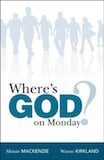Chapter 13 - Working Words: Changing Our Terminology
Book / Produced by Individual TOW Project member
We all know how important words are. They communicate more than just actions and ideas. Many words encapsulate and reinforce worldviews – ways of thinking.
For this reason we believe we simply must change our vocabulary when it comes to the issues this book raises. We are not talking just semantics. For the way words such as “work”, “secular”, “calling” and “ministry” are used has so warped and twisted the original intention, that every time we use them they are immediately heard, understood, and interpreted through the grid of the powerful worldview we have been seeking to challenge. Unless we change our vocabulary, we risk tripping up ourselves (and others). Every time we use those words and expressions, we’ll find ourselves reinforcing the old ways of thinking.
Let’s consider some specific words.
Work
We looked at this in the Introduction. Because the word “work” has such a wide range of connotations, how can we make clear what we mean?
Simply by using a more specific word. It’s with paid work that most of the problems arise. So if that’s what we’re referring to, then “job” or “paid work” or “employment” (or even the older word “occupation”) are options to consider using.
If it’s voluntary work or tasks around the home, then the words “tasks” and “roles” become helpful. For example, “I’ve been working in my role as a school trustee.” Or, “I’ve got a number of tasks to do around the house on Saturday. I think I’ll be working all day at them.”
Fulltime Christian service
What do we mean when we say “fulltime Christian service”? Generally we’re indicating that the person invests most of his or her week in a role within a Christian organization or church. All of us are fulltime in Christian service, so to make the differentiation it’s much better to say “church work”, “paid church staff”, “employed by a Christian (or mission) organization”, “cross-cultural missionary”, etc.
Secular
Here’s one word we think we should make every effort to ban from our vocabulary – unless we are referring to it in the negative sense (such as secularization). The images it conjures up almost entirely support a dualistic view of life. Remember, nothing in life is removed from God’s sphere – only what we deliberately divorce. The process of secularization is a very real trend – but it’s not one that should include us. For in reality, all of life is meant to be connected with God and his work.
Consequently, when we use the word “secular” we are making an unbiblical and unhelpful distinction. Of course it can be helpful to talk about our involvement in different spheres of life. But the words we use to describe them need to be chosen more carefully.
Four helpful terms to distinguish these spheres are – Marketplace, Community, Church, and Family. God is involved in all these arenas. When we exclude him we are contributing to secularization. Sadly Christians have virtually given in to this process in the marketplace and the community.
We’re not suggesting that the boundaries between these spheres of involvement are distinct. They’re quite loose and overlap at many points. Most of us work in all four of them – but to varying degrees. Some of us invest most of our effort in the marketplace – the worlds of business, law, education, and industry. Others are able to give a majority of their energy and time in the family, community, or in the church.
Consequently, rather than “the workplace” being interpreted as “the place of paid employment” or being limited to the marketplace, really should refer to all of these spheres.
Ministry
Few words are more problematic than ministry. This is not because it’s a bad word in itself, but mainly because of the way it is unwittingly used to support a secular/spiritual split. It often has the effect of elevating certain types of service above others – making them appear more “spiritual” or important.
“My ministry is encouraging people”; “I’m in the ministry;” “We held a time of ministry at the end of the service”; “ABC Ministries seeks to…”; “Let me minister to you.”
The words ministry and minister are used in countless different ways, usually to in some sense highlight the “spiritual” nature of the task or role. But what does the word really mean? Paul Stevens comments:
The word ministry is derived in both Greek and Hebrew from a word that simply means “service”. A Christian servant is someone who puts himself or herself at God’s disposal for the benefit of others and for the stewardship of God’s world. Christian service – commonly called ministry – accords with God’s purposes for people and the world and has the touch of God, often unknown to the servant. Christian service makes no distinction between the sacred and the secular. Washing dishes, designing a computer program, preaching a sermon and healing the sick are all one….[1]
Our suggestion here is that, given the way this word is so badly abused, we may do better to replace “ministry” with “Christian service” or just “service”. Not only will this help to work against our dualism, but it will also have the effect of putting all service (given to God) on an even footing.
Calling and Vocation
Calling is one word that is worth “redeeming”, if only because there is no easy alternative to replace it with. Vocation would have been the obvious candidate, but over the last few centuries it has been thoroughly “secularized” and watered down to mean something far less than originally intended.
However, we suggest that you aim to use the word “calling” with some discrimination. Be careful and selective in its use. The chapter on “Calling” helps to fill out the biblical meaning of the term. Used in the right sense and context it can be a powerful word, connecting who we are and what we do with our source and leader, Jesus.
“What do you do?”
Perhaps the most defining question in our culture is the introductory question, “What do you do?” It says a lot in itself. Notice it doesn’t say, “Who are you?” or “What’s important to you?”
Of course we must be careful not to read too much into this culturally-polite small talk. In itself it’s a good way of inviting people to share about themselves. However, as we’ve seen, the problem is what it implies – the suggestion that who we are and what we’re worth as people is so much wrapped up in our occupation. As if my paid employment could define my identity as a person! (Worse, what it says about people who aren’t paid for the work they do is depressing. Does this make them less than full persons?)
Incidentally, it’s worth pointing out that our own culture’s introductory question is not always as innocent as it may appear. Often it contributes to the status and prestige games our society encourages us to play. Tony Campolo tells of how his wife Peggy grew tired of the points-scoring at dinner and cocktail parties, and the way it made her feel so worthless. For example, she would ask a young woman what she did for a job and the woman would reply something like, “I’m a lawyer with Bond, Gibbon and Priest, specializing in commercial law and public policy. And what do you do?” Flattened, Peggy would usually offer apologetically, “Oh, I’m just a housewife.”
Determined not to be intimidated in future, she worked out a patter. The next dinner party, when asked what she did, Peggy replied seriously, “I’m involved in the socialization of two homo sapiens, into the dominant values of the Judeo-Christian tradition so that they might be transformers of the social order into the kind of eschatological utopia God willed for us before the foundation of the world.” – or words to that effect.
The incident is a salutary insight into the power of grand phrases, for when as an apparent afterthought Peggy asked, “And what do you do?” … her unnerved acquaintance could only manage, “Oh, I’m just a lawyer”!
Perhaps those of us with less definable working weeks or with low status occupations could design a reply patter like Peggy’s! But just as important is thinking about what we can do to disengage some of the “power” that goes with this small question. What about using some alternatives such as, “What does your week consist of?” or “Tell me a little about yourself.”
A caution
In offering the suggestions in this chapter, we are conscious that we are only too much at risk of stepping into another trap that has beset Christians over the centuries – the trap of laying down yet another set of rules. Nothing could be worse than creating a group of buzzwords that mark out our so-called spiritual maturity.
So let us emphasize that these are just suggestions. Ways to break the pattern of thinking that has bedeviled the church from its earliest days. For words do matter. They often give subtle messages about how we value people. They frequently indicate how we think about what others spend their lives doing.
So, without setting up a new legalism, let’s take a little trouble to use words carefully and help them carry the meaning we intend.
Up Close and Personal
- Can you think of other words or phrases that are problematic in working against a biblical view of work? Suggest some good alternatives.
- Within the life of your own faith community, what are some of the assumptions that deserve to be challenged? Are there words and terminology that should be made more transparent or honest or unambiguous?
Exercise
Refer back to the list of roles and tasks you made at the end of Chapter 1. Try to group them into the four spheres of involvement (marketplace, family, community and church).
- Which sphere dominates your time and energy? (Remember, these spheres overlap somewhat.)












